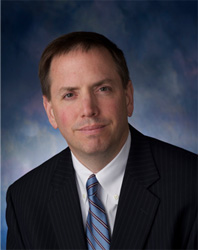
UPMC's Dr. Andrew Watson
The long-awaited boom in home-based, wireless health monitoring devices might happen sooner rather than later. In fact, Dr. Andrew Watson, medical director of the UPMC Center for Connected Medicine in Pittsburgh, believes that it will start in the next six to 12 months.
"Right now, the devices are so close," Watson says. And the biggest driver will be cost avoidance, either by payers, integrated health systems or even consumers.
"We need to stress the fact that healthcare is going to be virtualized very soon. In this world, the data that we need is going to be living in a virtual world," says Watson, a fourth-generation surgeon who is a regular user of telemedicine. In fact, he says that about one third of his practice is cloud-based.
"My communication is almost immediate," Watson says. "I threw my pager away and I don't miss it."
Watson actually performs rounds in rural and outlying hospitals from his downtown Pittsburgh office thanks to a telemedicine cart, a process he calls tele-rounding. An ultrasound badge on the cart verifies his virtual presence.
He also says it is safer, cheaper and requires less time off work for patients to get their healthcare needs met online rather than in a traditional healthcare setting. Watson reports that he has performed consultations while in India and Mexico.
"The delivery method of healthcare is not talking clearly to the patient right now," Watson says. "That is changing in Pittsburgh."
In fact, he says that he asks his patients not to call his office, but rather to communicate online, where they can see their electronic health records, view test results, and report back with updates on their health status through UPMC's patient portal. Soon, Watson believes patients will use their phones to communicate with health providers, but mostly to dictate notes like physicians do now. Patient voice messages will be captured for transcription and incorporation into the medical record, Watson says.
But healthcare infrastructure has to support this, not just provide traditional means of care. "A connected environment is absolutely critical," Watson says, touting UPMC's tight integration of hospitals, clinics, physician practices and a health plan, enabled by technology. "The heart of the connected environment is the data center."
UPMC has committed more than $400 million just to a partnership with IBM and has relationships with dozens of other IT vendors, including EHR vendors Epic Systems, Cerner and Allscripts. Mobile technology providers Verizon, BlackBerry and Nuance Communications are among the organization's partners in the Center for Connected Medicine. The center serves as a showcase for how UPMC is working to improve healthcare processes.
"We have to rethink the way we practice healthcare," Watson says.















